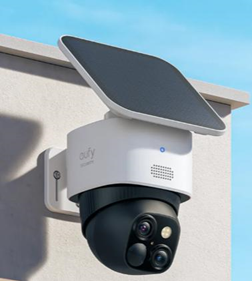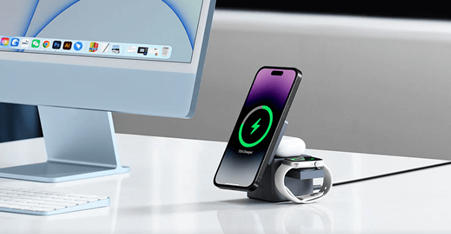By EMILY BIRNBAUM
Presented by Charter Communications
With help from Rebecca Kern
Editor’s Note: Morning Tech is a free version of POLITICO Pro Technology's morning newsletter, which is delivered to our subscribers each morning at 6 a.m. The POLITICO Pro platform combines the news you need with tools you can use to take action on the day’s biggest stories. Act on the news with POLITICO Pro.
Quick Fix
— Lobbying surge:The major tech companies boosted their lobbying spending by more than $21 million in 2021, and their smaller rivals spent more, too.
— Natsec takes center stage:Big tech companies are mobilizing around the message that antitrust reform could hurt U.S. national security.
— Privacy warning: In the latest volley in the back and forth over federal privacy legislation, a tech-funded research paper argues that the growing patchwork of state privacy laws could cost the industry more than $1 trillion.
HAPPY MONDAY. I’m your temporary host, tech lobbying and influence reporter Emily Birnbaum. What stood out to you in the 2021 lobbying disclosures?
Contact me on Twitter with lobbying tips @birnbaum_ e or by email at [email protected]. Got an event for our calendar? Send details to [email protected]. Anything else? Team info below. And don’t forget: Add @MorningTech and @PoliticoPro on Twitter.
Tech of the town
TECH LOBBYING SURGE — Apple, Amazon, Google and Facebook spent a total of more than $55 million on lobbying the federal government in 2021, according to newly filed lobbying disclosures, breaking their own records and outstripping other top-spending industries in Washington, such as defense and pharmaceuticals, for another year in a row. In comparison, the “Big Four” tech companies spent about $34 million on lobbying in 2020.
— Behind the increase: Google’s spending jumped roughly 27 percent, from $7.5 million in 2020 to $9.5 million in 2021, as the company has sought to fend off antitrust legislation and has dealt with concerns about YouTube’s contribution to right-wing radicalization.
Facebook and Amazon broke their own spending records, with Amazon shelling out $19.3 million and Facebook spending more than $20 million. Facebook’s spending spree came as the company dealt with fallout from whistleblower Frances Haugen’s revelations; Amazon has faced antitrust heat as well as significant labor complaints.
Apple, which has had a more muted presence in Washington, spent $6.5 million in 2021 — a small number compared to its “Big Four” peers but still vastly more than smaller tech companies such as Spotify, which spent $820,000 in 2021.
— Speaking of those smaller rivals … 2021 was a huge year for the small- to medium-sized tech companies, which say they have been harmed by gatekeeping by giants like Google, Facebook, Amazon and Apple. Complaints from companies like Oracle, Yelp, Tile and Spotify have taken center stage and informed antitrust legislation now moving through the House and Senate Judiciary Committees. As a result, ‘Big Tech’’s rivals are spending more than ever, too:
Oracle, the software company known for taking on Google, spent $9.1 million on lobbying in 2021, up from about $8 million the year before.
Microsoft, though hardly a small company, has gained a reputation for lobbying against its tech-sector rivals. It spent about $10.2 million on lobbying in 2021 compared to $9.4 million in 2020, an increase of roughly 8 percent.

Fox Corp., the media company owned by Big Tech antagonist Rupert Murdoch, increased its spending by about 22 percent between 2020 and 2021, as the company lobbied in favor of the antitrust bills in both chambers. Fox spent $3.6 million in 2021, compared with $3 million in 2020.
Epic Games, which is locked in a legal battle with Apple over Apple’s App Store, registered its first in-house lobbyists during the last month of 2021, reporting $40,000 in in-house lobbying spending. Epic also tapped a pair of high-powered outside lobbying firms last year, the Gibson Group and Subject Matter.
— Overall, this spending pales in comparison to the tens of millions spent by Facebook, Amazon and Google. But it’s still notable that these companies are dialing up their presences in Washington, readying themselves for all the fights ahead.
NATSEC HAWKS ARE CIRCLING — As the tech antitrust bills pick up steam in the Senate, Google has been the tech company most forcefully pushing the idea that reforms could threaten national security.
“Handicapping America’s technology leaders would threaten our leading sources of research and development spending,” Google’s president of global affairs and chief legal officer, Kent Walker, wrote in a blog post last week. He argued that the bill that received a markup, S. 2992 (117), would “give a free pass” to foreign companies and cited a letter from last year from twelve former U.S. national security officials who argued the antitrust bill could hurt U.S. competitiveness. (All 12 former officials have ties to major tech companies, as POLITICO previously reported.)
The legislation would prohibit Apple, Facebook, Amazon and Google from favoring their own products and discriminating against rivals on their platforms. Google spokesperson Julie Tarallo told MT that the company believes S.2992 “risks threatening our global competitiveness and security, which is why we will continue urging Congress to take more time to consider these and other unintended consequences.”
Meanwhile, The Taxpayers Protection Alliance, which receives funding from Google and is backed by groups connected to conservative billionaire Charles Koch, last week announced a seven-figure digital ad buy criticizing the antitrust legislation, emphasizing how the bills could harm national security and American jobs.
— How it’s landing: Several Democratic and Republican lawmakers during last week’s markup raised concerns that one antitrust bill, S.2992, could make the U.S. less competitive with China, echoing the companies’ arguments. “I want to make sure we are not inadvertently harming national security,” Sen. Sen. Patrick Leahy (D-VT) (D-Vt.) said during last week’s markup. Two congressional aides, who requested anonymity because they are not authorized to speak on the record, told MT that Google and Amazon have been relying on those arguments particularly with China hawks in the Senate, such as Sen. Sen. Tom Cotton (R-AR).
— Kicking into high gear: Amazon, Facebook and the Computer and Communications Industry Association, a tech trade group of which they are members, in recent months have all started donating significant sums to the Center for International and Strategic Studies, a leading defense and national security think tank. Their new donations highlight how the companies are leaning into national security messaging as CSIS becomes more involved in the antitrust debate. (A spokesperson for Meta, the parent company of Facebook, said Meta “supports CSIS along with a number of nonprofit groups.”)
CSIS updated its corporate donors list last month to show that Amazon and Facebook are now big supporters, with Facebook giving between $200,000 and $499,000 (the highest corporate donor bracket) and Amazon giving between $35,000 and $64,999. CCIA also joined as a donor in the $100,000 to $199,999 category. Google and Apple were already donors in some of the smaller brackets.
— The counterargument: Embattled industries have long argued that regulation. could harm U.S. competitiveness and security, only to be proven wrong once antitrust action is taken. Qualcomm, for example, argued that the Trump administration was risking ceding the future of 5G to China by pursuing a case against the company; AT&T in the 1980s told the Defense Departmentthat the government’s antitrust lawsuit could make the U.S. vulnerable to attack. Those doomsday predictions did not bear out.
“The argument they make is that gigantic tech companies are the only ones who can innovate and compete with China,” said Ernesto Falcon, senior legislative counsel with the Electronic Frontier Foundation. “But this completely misses the point. … When companies have monopolies, they have no reason to innovate, since they have captured the market.”
Digital rights groups like EFF argue that these national security arguments ring hollow because companies’ loyalties are to their shareholders, not to U.S. national security. In fact, top tech companies like Apple and Googlehave done extensive business in China .
“Relying on large monopoly corporations to act in the best interest of national security is futile and goes against their very legal and operational foundations,” advocacy groups, including the American Economic Liberties Project, wrote in a letter sent to House leadership last year.
STATE PRIVACY LAWS ADD UP: Over a 10-year period, a patchwork of privacy laws across all 50 states could lead to company compliance costs exceeding $1 trillion, according to a report from a tech-funded think tank, the Information Technology and Innovation Foundation. In the absence of a federal privacy law, conflicting compliance regimes for companies could cost companies between $98 million to $112 billion annually, the report found. ITIF receives funding from the tech industry, including Apple, Microsoft, Google, Intel and more.
The report provides “evidence for policymakers to decide what are the economic ramifications” if they don’t pass a federal law, Daniel Castro, a vice president at ITIF and report author, told Rebecca.
— Privacy advocates’ perspective: Some tech critics have argued that it’s better for U.S. states to pass strong legislation than for the federal government to pass a watered-down privacy law. But many of the state laws that have passed over the past year have been panned by privacy advocates as weak, prompting both privacy groups and industry to push for their own preferred models of federal privacy legislation.
— To date, Congress has failed to reach bipartisan agreement on a federal privacy bill, so California, Virginia and Colorado have passed their own laws. This means tech companies will have to comply with privacy rules in-state and out-of state if they operate in multiple states.
— “I’m cautiously optimistic that there's a willingness to compromise because businesses want a federal law,” Castro said. “That might be the motivation it takes to get something done.”
FIRST IN MT: AI REGULATION GETS PUBLIC BACKING — More than 80 percent of Americans favor regulating all or most uses of artificial intelligence technologies, according to a survey from the U.S. Chamber of Commerce.
Respondents identified self-driving vehicles, law enforcement and health care as the top uses of AI they want to see regulated, based on the survey of 1,000 respondents throughout the country.
More than 80 percent of respondents said the U.S. should lead in AI tech development in general. Americans surveyed also recognized that there will be job loss due to automation — 42 percent of respondents said believe AI will lead to “some job loss” in the U.S.
Transitions
BSA | The Software Alliance is adding Alteryx and Dropbox as global members. Chris Lal, chief legal officer at Alteryx, will join BSA’s board of directors. … Data analytics company LightBox has contracted with the state of Montana to supply its GIS technology and “SmartFabric” tools (unveiled last month) as part of the state’s efforts to create more accurate broadband maps, the company is announcing today … Ellen Canale, who has directed communications for Mozilla, is joining Stellar Development next month … Karen Modlin, who has managed corporate communications at Dish Network, has joined Zayo Group as director of communications
SILICON VALLEY MUST-READS
The story of an Amazon warehouse: How a small town in England has adapted after an Amazon warehouse was built in its midst, via The Wall Street Journal.
Another obstacle: Congress’ antitrust effort has been complicated by hate speech concerns, Protocol reports.
Merger surge: Amazon, Microsoft and Alphabet announced more acquisitions in 2021 than any other year in the past decade, according to CNBC.
Quick Downloads
Stock scrutiny: Rep. Marjorie Taylor Greene sold up to $15,000 worth of Activision Blizzard stock on the day Microsoft announced its acquisition, Business Insider reports.
Parents sue Meta, Snap: A girl’s mother is suing Meta and Snap, alleging social media was to blame for the suicide of her 11-year-old daughter, according to Bloomberg.
ICYMI: Republicans say the FCC disregarded advice from its own inspector general for preventing fraud in its $14 billion broadband program. John has more for Pros.
TTYL!









